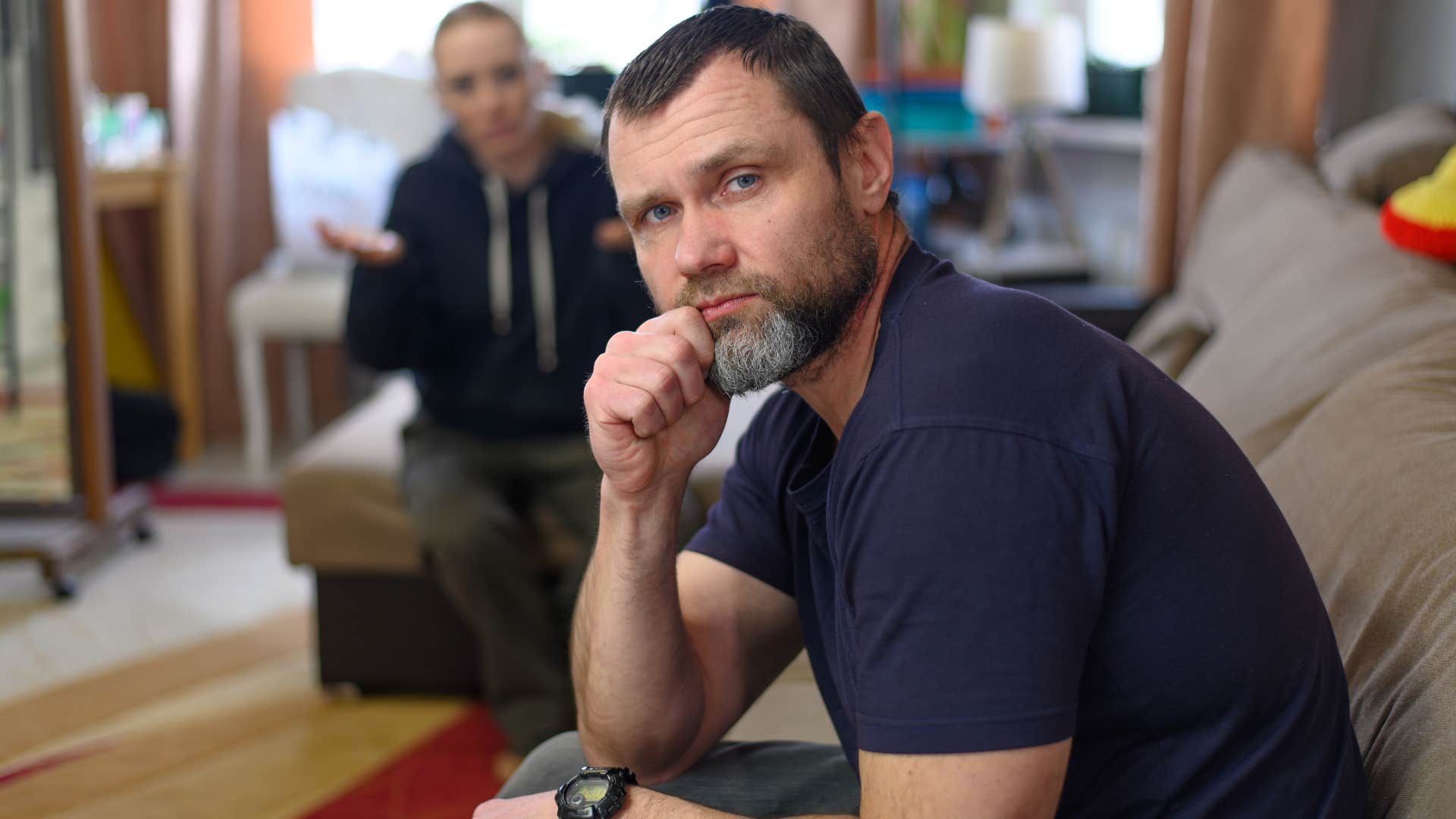12 Phrases To Use With Someone Who Always Plays The Victim
You deserve to protect your own emotional wellbeing and sanity.
 CarlosBarquero | Shutterstock.com
CarlosBarquero | Shutterstock.com Many people with narcissistic tendencies utilize self-victimization as a means to shift blame and avoid taking accountability for their harmful actions. They operate from a misguided sense of self, allowing their trauma and insecurity to craft a belief that their struggles in life are never their fault but rather a consequence of the people and environments around them.
While many struggle to pinpoint these behaviors or take action to protect themselves from these people, others advocate for specific phrases to use with someone who always plays the victim—both to protect their inner circle’s energy and emotional health.
Here are 12 phrases to use with someone who always plays the victim:
1.1. ‘Not everyone is out to get you’
 garetsworkshop | Shutterstock.com
garetsworkshop | Shutterstock.com
The cynicism and distrust that fuels many people playing the victim isn’t easily disrupted, especially by the people this person feels entitled to sharing emotional turmoil and responsibility with. Especially in situations with toxic men, who operate under hyper-masculine stereotypes, as research from Men and Masculinities argues, this victim mentality can be incredibly toxic — they fail to acknowledge their role in emotional abuse, conflict, and even societal gendered struggles in ways that actively harm other people.
Taking accountability for your own actions doesn’t make you susceptible to criticism for larger stigmas and societal problems, but it can help to protect the health of your own relationships. Victim mentalities are often fueled by this fear that everyone will turn on them, when in truth, it’s self-sabotage to the very end.
2.2. ‘You’re not the only person who’s struggling’
 Pro-stock Studio | Shutterstock.com
Pro-stock Studio | Shutterstock.com
With an inherent entanglement between narcissistic tendencies and playing the victim, according to the book “Narcissist Abuse Recovery,” many people struggling to acknowledge the power in their life have a sense of entitlement that motivates their toxic behavior. They don’t just fail to take responsibility for their actions, they shift blame to other people, expecting them to pick up the pieces, bear their heavy emotional burdens, and take the action they refuse to.
This entitlement can feel dehumanizing, even if the perpetrator is unaware that they’re playing the victim and forcing you to sacrifice your own wellbeing to support them. Reminding them of your humanity, your emotions, and the universality of the situation they’re in can help to put things in perspective — they’re not alone, but they need to take action to protect themselves like everyone else.
3.3. ‘That was a rude thing to say’
 New Africa | Shutterstock.com
New Africa | Shutterstock.com
While many experts suggest the best way to deal with someone who always plays the victim is simply not to react, others utilize “calling out” their behavior to protect their own peace. According to the Berkeley Well-Being Institute, victimhood is deeply ingrained in the identities of these people, making it difficult for them to truly acknowledge the harm behind their behaviors.
They have a narrow view of how the world works, believing that they have no agency in how their life unfolds. Without the empowerment of self-advocating and change, they blame others for their mistakes — sometimes, they need to be humbled, and more specifically, reminded that they have control over how they respond and navigate life’s events.
4.4. ‘Why are you comparing your life to someone else’s’
 Prostock-studio | Shutterstock.com
Prostock-studio | Shutterstock.com
If you’re noticing that a close friend or partner has a tendency to victimize themselves, you might want to help “snap them out” of their harmful tendencies — part of that is combating comparison culture. According to Current Psychology research, social comparison is the killer of comfort — it not only negatively affects people’s general psychological well being, but their greater mental health, depression levels, and anxiety.
You can’t compare your own situation to everyone else's — empowered people recognize that, living their lives in a uniquely personal way, driven by beliefs, motivations, and values that craft their reactions in life. People who constantly play the victim do the opposite, not only sacrificing the health of their relationships, but the comfort and trust they feel with themselves.
5.5. ‘What role did you play in that situation’
 Fizkes | Shutterstock.com
Fizkes | Shutterstock.com
The main psychological element of a person who constantly plays the victim is their defense mechanisms of denial, according to a study from the Psychology and Behavioral Science International Journal. They rely on denial of accountability as a means to draw attention to themselves, oftentimes in response to unmet needs or attention earlier in life.
Stepping away from “their game” and refusing to contribute to this demand for attention and victimization can help to craft healthier relationships. Use a phrase like this one to help demonstrate the roles these “victims” play in their own lives and situations — you’re not their therapist, but you might be able to spark a sense of authenticity and push them away from toxic attention-seeking behavior.
6.6. ‘I won’t tolerate that kind of behavior in my life’
 Violator22 | Shutterstock.com
Violator22 | Shutterstock.com
According to psychiatrist Steven Gans, people who always play the victim often approach situations from a negative perspective, resorting to anger when others try to cheer them up or advocate for them to take the control they’re trying to avoid in their lives.
While you have no power, at the end of the day, over how they live their lives, you can set boundaries for how they influence your own. If you’re feeling emotionally drained after hanging out with them, figure out where you need space and what behavior you’re unwilling to tolerate — and then, set that expectation. Just because they tend to struggle with resilience doesn’t mean you need to adopt a similarly ignorant and disconnected approach to your life.
7.7. ‘Why do you think my advice doesn’t apply to you’
 Srdjan Randjelovic | Shutterstock.com
Srdjan Randjelovic | Shutterstock.com
While defensiveness and pushback often causes people who play the victim to double-down and resort to anger, phrases like this one can help to validate your own emotions. People playing the victim will often dismiss or degrade helpful advice from others, according to research from Organizational Dynamics, which can be genuinely frustrating and toxic for relationships.
Instead of letting resentment bubble underneath the surface, remind them that you’re fully aware of their victimization tendencies. Urge them to take accountability, accept advice, or at the very least, prompt them to consider the autonomy they have over their own life. They expect so much and place so much emphasis on the power of other people’s actions, but refuse to accept their own — a phrase like this can spark that conversation.
8.8. ‘I see that this is upsetting for you’
 Voronaman | Shutterstock.com
Voronaman | Shutterstock.com
As a close friend or partner, you don’t have to empathize with someone’s misguided frustration as a result of self-victimization to soothe, you can simply make them feel heard and understood. Not everyone who plays the victim is an inherently bad person, in fact, many of them are our closest relationships and pillars in our lives.
Acknowledge their distress and offer sympathy and advice — they might not appreciate it, or even take it, but at the very least, it can start to break down their barrier to accountability by reminding them they have power over both actions and emotions.
9.9. ‘I can’t solve this problem for you, but I’m here to support you’
 SynthEx | Shutterstock.com
SynthEx | Shutterstock.com
Individuals who rely on playing the victim to solve their emotional turmoil will often offload the responsibility of navigating their life qualms with other people in their lives — from their closest friends, to their parents, and partners. Not only is this an active dismissal of other people’s emotional wellbeing, it prevents them from growing themselves — creating an internal mistrust and a harmful sense of inner disconnect.
As a friend or partner, you can’t solve someone else’s problems, especially when they stem from an internal place of struggle, but you can support them as they figure it out. Remind them that you don’t have any kind of power over their life, even if they are trying to suggest you can help — set that boundary, support them from afar, and avoid the turmoil of their greediness to your energy.
10.10. ‘What do you want to see happen here’
 Prostock-studio | Shutterstock.com
Prostock-studio | Shutterstock.com
According to therapist Stephen Karpman, the trick to dealing with a narcissist who plays the victim is to embody the nature of the “Empowerment Triangle” that focuses on coaching, cheerleading, and creating, rather than the “Drama Triangle” with victim persecutor roles. Find ways to empower them as “the creator” of their own life, cheerleading them along with the way.
When they bring up a struggle in their life or a negative feeling they’re experiencing, help them to envision the way they’ll get through it — or at least, how they’d prefer to feel. Because the act of victimization is so ingrained in many people’s psychological state, it can take some support to unlearn and break free of.
11.11. ‘It must be difficult to feel that way’
 Pressmaster | Shutterstock.com
Pressmaster | Shutterstock.com
While walking away or apologizing for not being able to help someone playing the victim can be appropriate in many situations, empathizing with someone’s constant struggle can help them to feel empowered to help themselves. Remind them that they’re in control, and more importantly, re-set the boundaries you need to protect yourself from taking some of that responsibility.
Someone who lives in constant turmoil, negativity, and victimhood likely experiences that emotional burden constantly — helping them to feel heard, but from a distance that empowers you to protect your own wellbeing.
12.12. ‘That’s unfair to me’
 Josep Suria / Shutterstock.com
Josep Suria / Shutterstock.com
According to licensed psychologist Dr. Menije Boduryan-Turner, it’s important to set boundaries that protect you from trying to “fix” someone else’s victim mentality — especially when they’re actively trying to shift blame or “guilt” you into helping them. Try your best not to feed into that mentality of guilt, and instead, remind them that you’re simply trying to support and empower them.
It’s not healthy for someone to blame-shift and fail to take accountability in any kind of relationship — it’s unfair to everyone involved. You’re not their therapist. You’re not the perpetrator of their struggles. You’re just their friend, parent, partner, or supporter, trying their best to help in a way that’s healthy for everyone. If you have to remind them of that, over-and-over to protect yourself, you should.
Zayda Slabbekoorn is a News & Entertainment Writer at YourTango who focuses on health & wellness, social policy, and human interest stories

